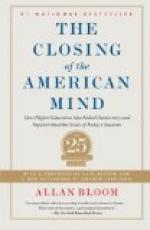There is, similarly, a certain justice in the subordination of the individual to the social class or group interest. It is right that artisans should unite in trade unions, that employers should get together in associations for common benefit. One need only contrast the conditions where each workman had to bid in competition against all others, and each manufacturer, the same, to realize the advance made through group union and cooperation. When either group, however, seeks to further its own interest at the expense of the welfare of the whole society, as in securing class legislation, achieving monopolies, holding efficient workers to the level of production of the slowest and least capable of the group, then the class or group spirit becomes an evil that must be fought for the good of all.
It is exactly the same with the nation. Its interest is justly served only in harmony with the welfare of humanity. Any current problem will illustrate the principle, as, for instance, that of immigration.
Certainly the nation has the right to prohibit immigration which produces unassimilated plague-spots and threatens to cause racial deterioration, as in phases of Oriental immigration to the Pacific coast. Similarly, it is right to restrict immigration that would further economic prosperity, at the expense of the manhood of the nation. We must answer the question, whether we want factories or men. It is desirable to have some of both, of course, but when one is to be obtained at the expense of the other, it is manhood that must be the deciding end.
On the other hand, when it comes to refusing a refuge to the poor and oppressed, who are physically and morally acceptable, but lack a small amount of money, or are unable to respond to a literary test, then the welfare of humanity demands the opposite decision. Better give them the fifty dollars—a healthy slave was worth more than that in the old days. So teach them to read and write. The nation, can readily pay the small economic price and accept the incidental difficulties for the sake of the larger end.
Thus the deciding principle must always be the welfare, happiness, growth, intelligence, helpfulness of each individual in harmony with all others. Humanity is incarnatein each man. While, therefore, the individual must dedicate and, at times, sacrifice himself, it is for the sake, not of the state, church or other institution, but for the welfare of all—Man for Mankind.
From so many sources the view finds expression that modern life has been “weakened by humanitarianism.” If there is truth in the view, we would better take account of it and radically revise our ethical philosophy. If it is false, it is a damning error, the reiteration of which tends to undermine all that has been achieved for the spirit.




